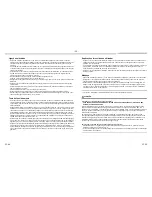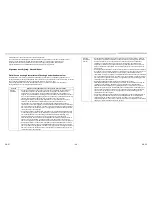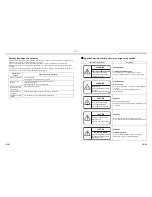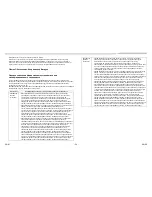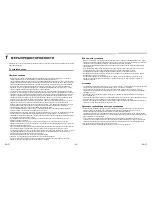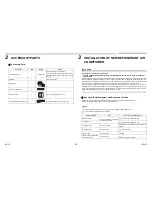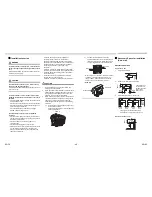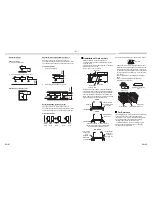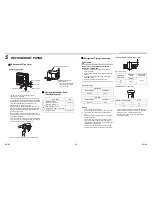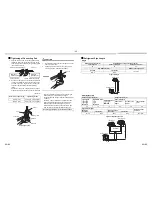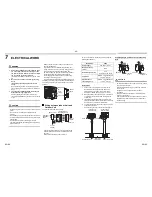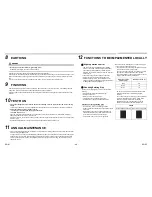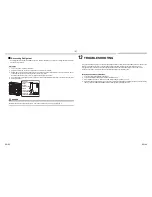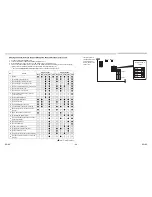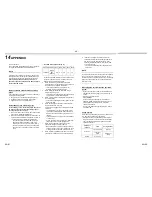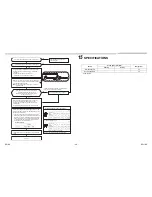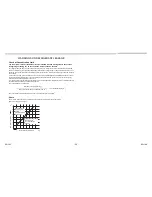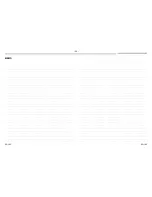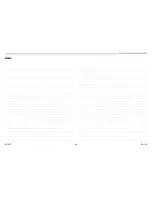
- 39 -
EN-77
EN-78
Refrigerant Piping
New refrigerant (R410A)
When using the conventional piping
• When using the conventional piping with no indication of applicable refrigerant types, be sure to use it with a wall
thickness of 0.8 mm for Ø6.4 mm, Ø9.5 mm, and Ø12.7 mm, and with a wall thickness of 1.0 mm for Ø15.9 mm. Do
not use the conventional piping with a wall thickness less than these thicknesses due to insufficient pressure
capacity.
When using general copper pipes
• Use general copper pipes with a wall thickness of 0.8 mm for Ø6.4 mm, Ø9.5 mm, and Ø12.7 mm, and with a wall
thickness of 1.0 mm for Ø15.9 mm.
Do not use any copper pipes with a wall thickness less than these thicknesses.
Flare nuts and flare machining
• The flare nuts and flare machining are different from those for the conventional refrigerant.
Use the flare nuts supplied with the air conditioner or those for R410A.
• Before performing flare machining, carefully read “REFRIGERANT PIPING”.
Flare tool
Flare machining of pipes
Usable if dimensions are adjusted.
Bender
Bending pipes
R22 (Conventional tools)
Refrigerant recovery equipment Refrigerant recovery
For R410A only
Torque wrench
Tightening flare nuts
Exclusive for Ø12.7 mm and Ø15.9 mm
Pipe cutter
Cutting pipes
R22 (Conventional tools)
Welding machine and nitrogen
cylinder
Welding pipes
R22 (Conventional tools)
Refrigerant charging measure
Charging refrigerant
R22 (Conventional tools)
Tools/equipment
Use
How to use tools/equipment
4
INSTALLATION CONDITIONS
Before installation
Be sure to prepare to the following items before
installation.
Length of refrigerant pipe
* Caution during addition of refrigerant
When the total length of refrigerant piping exceeds
30 m, add 40 g/m of refrigerant up to a maximum total
length of piping at 50 m. (Max. amount of additional
refrigerant is 800 g.)
Charge the refrigerant accurately. Overcharging may
cause serious trouble with the compressor.
• Do not connect a refrigerant pipe that is shorter than
5 m
.
This may cause a malfunction of the compressor or
other devices.
Airtight test
1.
Before starting an airtight test, further tighten the
spindle valves on the gas and liquid sides.
2.
Pressurize the pipe with nitrogen gas charged from
the service port to the design pressure (4.15 Mpa) to
conduct an airtight test.
3.
After the airtight test is completed, evacuate the
nitrogen gas.
Air purge
• To purge air, use a vacuum pump.
• Do not use refrigerant charged in the outdoor unit to
purge air. (The air purge refrigerant is not contained in
the outdoor unit.)
Electrical wiring
• Be sure to fix the power wires and indoor/outdoor
connecting wires with clamps so that they do not come
into contact with the cabinet, etc.
Earthing
WARNING
Make sure that proper earthing is provided.
Improper earthing may cause an electric shock. For
details on how to check earthing, contact the dealer who
installed the air conditioner or a professional installation
company.
• Proper earthing can prevent charging of electricity on
the outdoor unit surface due to the presence of a high
frequency in the frequency converter (inverter) of the
outdoor unit, as well as prevent electric shock. If the
outdoor unit is not properly earthed, you may be
exposed to an electric shock.
• Be sure to connect the earth wire. (grounding
work)
Incomplete grounding can cause an electric shock.
Do not connect ground wires to gas pipes, water
pipes, lightning rods or ground wires for telephone
wires.
Test Run
Turn on the leakage breaker at least 12 hours before
starting a test run to protect the compressor during
startup.
CAUTION
Incorrect installation work may result in a malfunction or
complaints from customers.
Length of refrigerant
pipe connected to
indoor/outdoor unit
Item
5 to 30 m
Addition of refrigerant is
unnecessary at the local
site.
*31 to 50 m
<Addition of refrigerant>
Add 40 g of refrigerant for
every 1 m of piping that
exceeds 30 m.
Summary of Contents for RAV-SP804ATJP-E
Page 54: ... 53 EN 105 EN 106 MEMO ...
Page 55: ... 54 MEMO EN 107 EN 108 ...
Page 56: ...1114550101 ...

